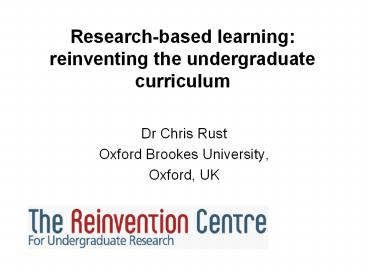Research-based learning: reinventing the undergraduate curriculum PowerPoint PPT Presentation
1 / 16
Title: Research-based learning: reinventing the undergraduate curriculum
1
Research-based learning reinventing the
undergraduate curriculum
- Dr Chris Rust
- Oxford Brookes University,
- Oxford, UK
2
The Reinvention Centre
- One of 74 Centres for Excellence in Teaching and
Learning (CETLs) - Joint project with Warwick (lead)
- Five years funding (05-10)
- 500,000 recurrent over 5 years and 800,000
capital funding
3
Reinventing the undergraduate curriculum
- Aim is to recreate the notion of an inclusive
community where learners, teachers and
researchers are all seen as scholars in the
common pursuit of knowledge by promoting the
development of research-based teaching and
learning
4
History
- In US, every university to provide
opportunities to learn through enquiry rather
than simple transmission of knowledge(Boyer
Commission,199912) - acknowledging the influence of John Dewey
(1938), and his observation that learning is
based on discovery guided by mentoring rather
than on the transmission of information
(Ibid15) - But also.
- Knowledge emerges only through invention and
reinvention, through the restless, impatient,
continuing, hopeful inquiry women pursue in the
world, with the world, and with each other
(Paulo Freire, 1970) - and in Germany, In both teaching and research
universities should treat learning always as
consisting of not yet wholly solved problems and
hence always in a research mode - (von Humboldt, 1870 quoted by Elton, 2005)
5
Research-based learning
- Five perspectives Castley (2007)
- outcome-focus
- tools focus
- process focus
- context focus
- pedagogy focus
6
Based on Healey (2005)
7
Defining undergraduate research in the US
- CUR An inquiry or investigation conducted by an
undergraduate student that makes an original or
creative contribution to the discipline - But tensions, Beckman Hensel (2007)
- Student, process centred vs Outcome, product
centred - Student initiated vs Faculty initiated
- Honors students vs All students
- Curriculum based vs Co-curricular fellowships
- Collaborative vs Individual
- Original to the student vs Original to the
discipline - Campus/community audience vs Professional
audience
8
Research-based learning - why?
- The research/teaching nexus - turning the
rhetoric into reality (e.g. Hattie Marsh, 1996) - Research-based learning is arguably the ultimate
in inquiry-based learning, developing critical
thinking, analytical and evaluative skills - Employability and lifelong-learning, better
equipping students to live in a complex,
uncertain world where knowing how to inquire is a
key survival skill (Brew, 200614) - Inclusive, joint enterprise - community of
practice (Wenger, 1998)/learning organisation
(Senge, 1990) - Improved retention and completion, elevates
degree aspirations and greater likelihood to
continue to postgraduate study (Pascarella
Terenzini, 2005)
9
Research-based learning could involve
- learning about current (and past) research issues
- learning how research issues are investigated
- learning how research can be critically appraised
- learning about research done by lecturers
- learning by helping lecturers with their research
- learning by carrying out research
10
Task 1 How much are you doing already?( why
dont we call it research?)
- Projects
- Investigations
- Dissertations
- Problem-based learning
- Enquiry/inquiry-based learning
- Literature review
- Patient study
- Child study
- Case study
- Client brief
- Consultancy
- etc..
11
Using course descriptions validation to develop
research-based learning
- Validate a module in Academic Literacy Practice
- Identify Research Skills in module descriptions
- Validate a Research Methods module, or
- Review the teaching of research methods
- Increase research experiences in Yr 2 modules
- Rename the dissertation/double honours module
Research Project
12
Learning by carrying out research
- This will obviously vary considerably dependent
on the discipline and which year of the
undergraduate programme is being considered, but
fundamentally the approach should be to make the
undergraduate curriculum parallel the research
process as much as possible so that the
experience students have in learning is the same
as the one staff have in researching - (Roger Brown, reported by Swain, 2007)
13
Task 2
- In 3s/4s, consider the examples.
- How might you introduce similar research
activity into a course/unit/module you teach?
14
Using course delivery to develop research-based
learning
- Include research staff in module teaching teams
- Emphasise research especially in second year
modules - Form subject groups in Academic Literacy
Practice and/or Research Methods - Develop Community Research projects
- Assemble a compendium of research skills, and
make clear where they are developed - Identify a distinct, research pathway
15
Using extra-curricula work to develop research
based teaching and learning
- Encourage students to carry out research projects
(URSS schemes) - Include undergraduate students in research bids
proposals - Encourage students to publish work
- Create a student journal (? on-line)
- Present outcomes of student research at visit
days - Organise an annual student research conference
16
Task 3
- In new groups, identify
- how best might you develop research-based
learning in your subject? - what difficulties do you envisage?

